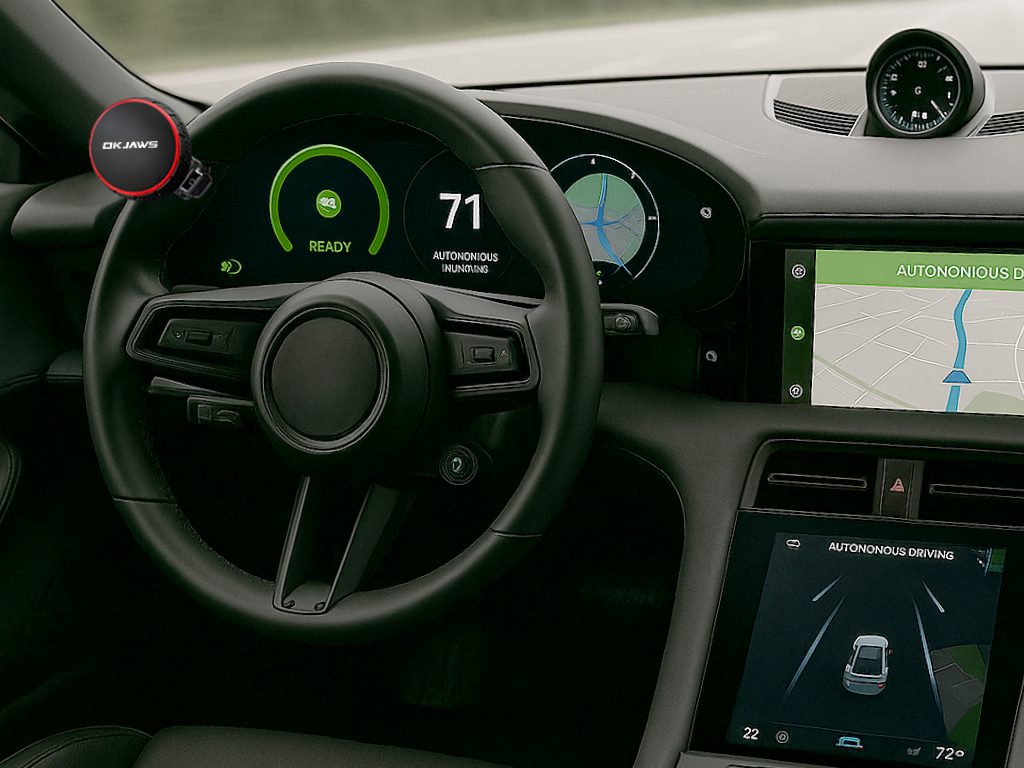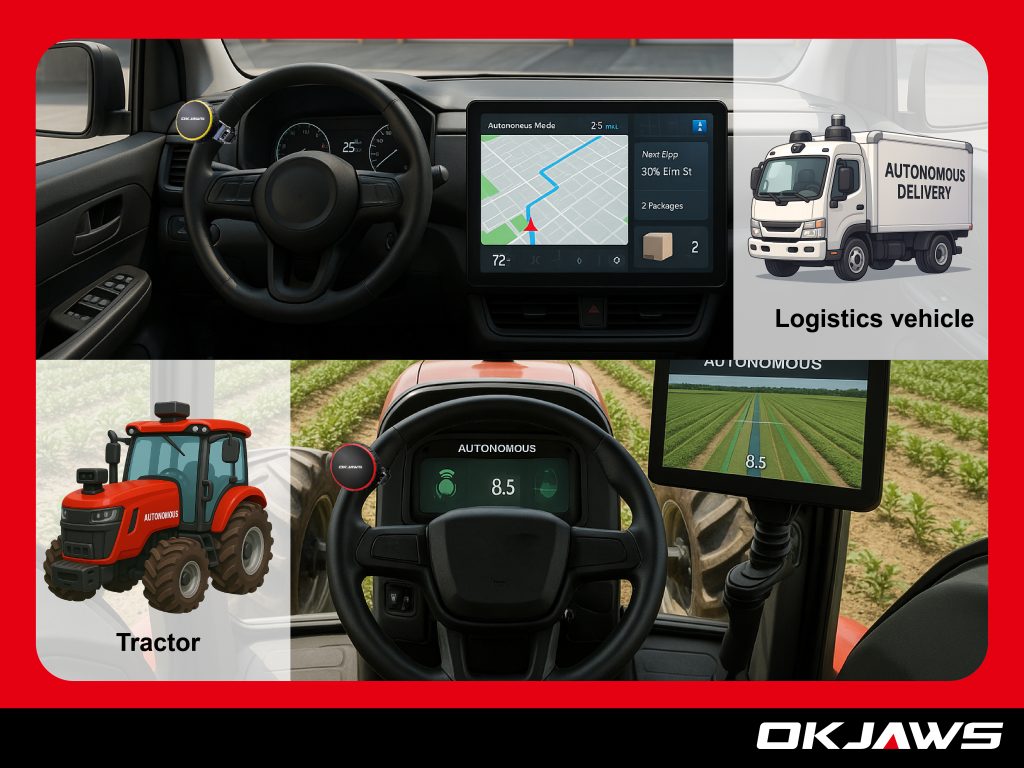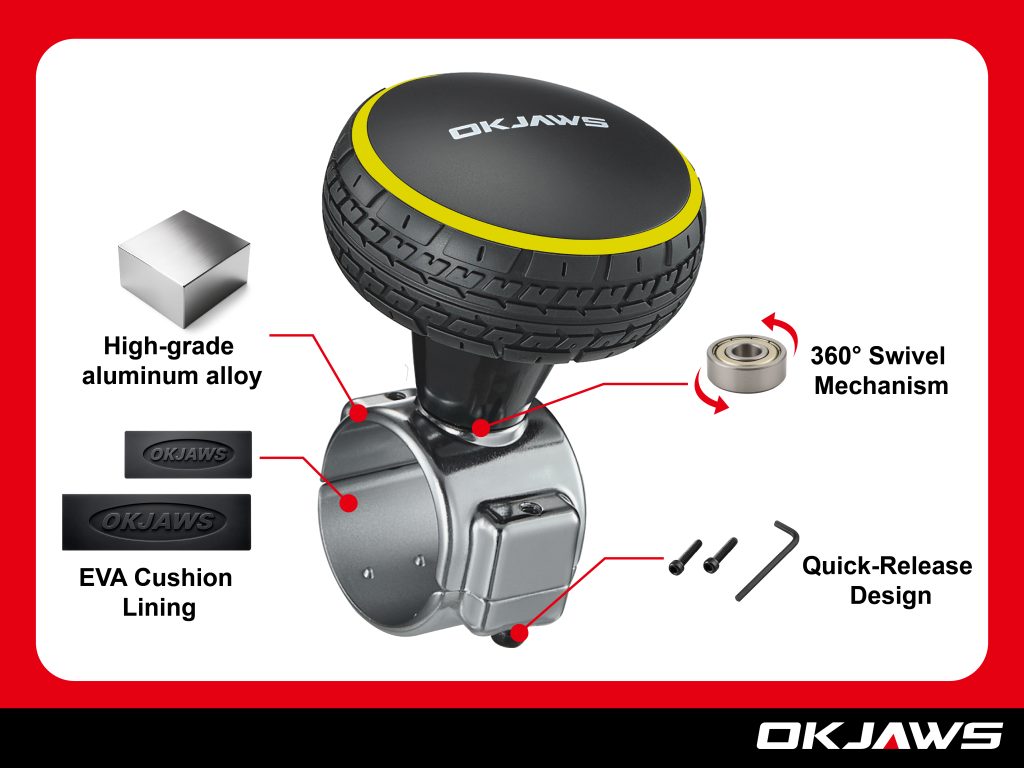Table of Contents
ToggleIntroduction: The Future of Driving Meets the Past of Precision
As the automotive industry accelerates toward electrification and autonomy, every component within the vehicle—from propulsion systems to human-machine interfaces—is being redefined. Electric Vehicles (EVs) and autonomous platforms (from Level 2 ADAS to fully self-driving Level 4 vehicles) demand a new class of accessories that balance intuitive user control with advanced engineering compatibility.
In this transformation, steering systems remain a vital point of interaction—even in semi-autonomous modes where manual input is intermittently required. For fleet operators, OEMs, and system integrators, the steering knob is no longer a low-tech add-on—it’s a precision accessory that must meet rigorous performance, safety, and integration demands.
Okjaws, a trusted steering knob manufacturer with over 40 years of engineering heritage, is uniquely positioned to support this transition. Founded in 1976 and headquartered in Changhua, Taiwan, Okjaws has consistently delivered innovative, ergonomic, and regulation-compliant steering solutions tailored for both traditional and next-generation vehicles. Leveraging decades of craftsmanship and R&D-driven innovation, the company is helping OEMs and Tier 1–3 suppliers equip EVs and autonomous vehicles with user-friendly, safety-enhancing control devices.
As we explore the integration of steering knobs into the evolving EV and AV landscape, Okjaws emerges as a benchmark in the category—bridging the human touch with digital steering intelligence.

The Rise of EVs and Autonomous Vehicles
The global automotive industry is entering a transformative era. Driven by environmental policies, digitalization, and evolving consumer expectations, the rapid rise of electric vehicles (EVs) and autonomous vehicles (AVs) is reshaping not only powertrains and sensors—but also driver interface components like the steering system. For suppliers of OEM accessories such as steering knobs, this transformation presents new requirements, new challenges, and abundant opportunity.
Global Market Growth of EVs and AVs
According to BloombergNEF’s Electric Vehicle Outlook 2024, EVs are projected to account for over 44% of global passenger car sales by 2030, up from just 14% in 2023. In parallel, McKinsey & Company estimates that Level 2 to Level 4 autonomous driving technologies will be featured in over 50% of new vehicles by 2035, particularly in the commercial, premium, and fleet segments.
The International Energy Agency (IEA) reports that global electric car stock surpassed 40 million units in early 2025, driven by strong government incentives, improvements in battery affordability, and growing consumer trust in EV reliability.
These milestones point to a seismic shift in vehicle architecture and user interaction—where software, automation, and sustainability are the new cornerstones of design.
Challenges in Steering System Design for L2–L4 Autonomy
Steering systems in autonomous and electric vehicles are no longer purely mechanical. Increasingly, OEMs are integrating steer-by-wire and electromechanical power steering (EPS) technologies to support both human and computer-directed control. This shift introduces several engineering demands:
- Seamless human-machine transition: In Level 2–3 vehicles, manual re-engagement must be intuitive, smooth, and immediate.
- Control precision and feedback must be maintained, even in systems where mechanical linkages are eliminated.
- Safety compliance becomes more stringent, requiring fallback strategies for Level 4 platforms and compliance with standards like FMVSS, UN R79, and ISO 26262.
As a result, steering accessories—even something as traditionally analog as a knob—must evolve to meet the demands of digital steering environments.
Importance of Ergonomic and Adaptive Components in Modern Cockpits
With the rise of EVs and AVs, cockpits are transforming into intelligent spaces that balance automation with occasional human control. In ride-share fleets, last-mile EV delivery vans, and AVs used in semi-autonomous mode, drivers are frequently required to take over in dense traffic or parking scenarios.
Here, ergonomically optimized steering knobs serve as a practical solution. Products like OKJAWS’ precision-engineered knobs help:
- Enhance low-speed maneuverability in tight urban settings.
- Reduce wrist fatigue and improve control for drivers in frequent stop-start scenarios.
- Enable accessibility, especially for elderly or disabled drivers operating vehicles with autonomous support systems.
As a trusted OEM accessory supplier, OKJAWS combines decades of expertise with forward-thinking design to create components that meet modern cockpit needs. Their zinc alloy construction, precision bearing systems, and secure screw-mounted design are ideal for integration into EV and AV platforms where performance and safety are non-negotiable.
Steering Knobs in the Era of Assisted Driving
While the world is shifting toward automation, the role of tactile, ergonomic driving tools is far from obsolete. In fact, as vehicles incorporate increasingly sophisticated driver-assist systems, the need for human-machine interface components like steering knobs is becoming more refined—especially in use cases that demand manual control under partially autonomous conditions.
Evolution of the Traditional Steering Knob
Originally designed to aid low-speed maneuvering in large commercial vehicles and vehicles driven by individuals with limited arm strength or mobility, the traditional steering knob served a simple purpose: improve rotational control with less physical effort. However, the requirements of today’s Level 2 and Level 3 autonomous systems demand a reimagining of that role.
Modern knobs—like those engineered by OKJAWS—now feature:
- Precision ball-bearing mechanisms for ultra-smooth rotation.
- Zinc alloy bases that outperform plastic in both strength and vibration resistance.
- Secure screw-mounted systems that prevent loosening or slipping, a vital safety consideration in automated platforms.
- Optional OEM customization, allowing for brand alignment, driver ID tagging, or even smart handle functionality.
This evolution ensures that the steering knob is no longer a legacy add-on, but a critical component of hybrid manual-digital steering systems.
Practical Role in Assisted Driving Scenarios
As the vehicle shifts partial responsibility to software—especially during highway cruising or automatic lane-keeping—the scenarios where a driver must retain or resume control become both more frequent and more complex. In these moments, a precision knob can support immediate and controlled input.
Key applications include:
1. Assisted Parking
Even with auto-parking features, many systems still require final adjustments or manual corrections. A knob allows for:
- One-handed control in tight urban environments.
- Quicker steering wheel re-centering post-park.
- Fine-tuned movements that reduce parking damage risk.
2. Low-Speed Maneuvering
In EVs—especially those with steer-by-wire systems—the lack of mechanical feedback can make low-speed turns feel unfamiliar. Knobs help drivers:
- Maintain precise control in warehouse vehicles or logistics vans.
- Improve comfort during repetitive turns or loading dock navigation.
- Handle tight-radius turns with minimal hand repositioning.
3. Delivery Fleets & Autonomous Ride-Sharing
Fleet drivers in semi-autonomous vans or robotaxis often handle thousands of micro-maneuvers per day. In these cases:
- A steering knob reduces wrist and shoulder fatigue.
- Provides a stable grip for quick transitions between auto and manual mode.
- Enhances performance for multi-stop delivery applications, especially in congested zones.
4. Steer-by-Wire Integration
In EVs using electronic steering, traditional wheel feedback is minimized or eliminated. Steering knobs fill this sensory gap by:
- Offering a familiar, physical touchpoint in an otherwise digital steering system.
- Helping maintain spatial awareness and torque confidence during control transitions.
- Adding an element of manual override preferred by professional drivers and technicians.
Designed for Compatibility, Built for the Future
Steering knobs by OKJAWS are engineered to work seamlessly with today’s steering technologies. From traditional mechanical linkages to steer-by-wire systems in the latest EVs, these knobs are built to:
- Withstand vibration and torque demands of electric drivetrains.
- Align with advanced driver-assistance systems (ADAS).
- Support OEM-level quality control, branding, and global safety compliance.
In the context of assisted driving, the steering knob is no longer a workaround—it’s a precision interface that enhances driver safety, control, and comfort, especially where the human hand remains part of the equation.
Why OEMs and Fleets Still Need Steering Knobs in AVs
The arrival of autonomous driving systems has significantly redefined cockpit expectations, but it has not eliminated the need for physical driver controls. For many Level 2–3 systems—and even in certain Level 4 scenarios—human-in-the-loop operation remains essential. Steering knobs, traditionally used for ergonomic control, are now gaining new relevance as part of hybrid automated/manual driving environments.
Manual Override in Level 2–3 Autonomy
In semi-autonomous vehicles such as those operating under SAE Levels 2 and 3, systems may handle lane centering, adaptive cruise control, or self-parking, but drivers must remain alert and ready to resume control at any time.
In these transition moments, steering knobs provide:
- Faster manual response during system handover.
- Improved rotational leverage, especially when immediate adjustments are needed.
- Single-handed control, critical for managing rapid interventions.
This is especially beneficial in fleet-based operations—such as urban delivery, commercial ride-hailing, or shuttle services—where multiple system handovers occur per shift. Okjaws knobs, engineered with precision bearings, anti-slip grip, and screw-secure mountings, deliver consistent performance for high-frequency usage environments.
Enhancing Accessibility for Elderly and Disabled Drivers
As global populations age, vehicle designs must prioritize inclusive mobility. According to the World Health Organization, by 2030, 1 in 6 people in the world will be aged 60 or older. This demographic shift is driving demand for assistive driving solutions, including ergonomic steering knobs.
Steering knobs offer:
- Low-effort control for drivers with limited strength or joint mobility.
- Safer maneuvering for people managing arthritis, Parkinson’s, or stroke recovery.
- Regulatory compliance in accessibility vehicle fleets (e.g., wheelchair-accessible AV taxis or paratransit services).
Knobs like those manufactured by Okjaws are often specified by fleet managers looking to reduce fatigue, improve driver retention, and meet diversity and inclusion goals in vehicle design.
Use Cases in Robotic Delivery, Warehouse EVs, and Smart Agriculture
Autonomous applications continue to expand beyond passenger cars—into logistics, warehousing, and agriculture. Even in these settings, manual fallback or technician-assist functionality is crucial, and steering knobs play a vital role in ensuring precision and control.
Robotic Delivery Vehicles
Autonomous ground delivery vehicles (AGVs), such as those developed by Nuro or Starship Technologies, often require setup, testing, or emergency override—best performed with intuitive manual control aids like knobs.
Warehouse EVs
Low-speed autonomous material movers or forklifts frequently switch between autonomous and manual modes. Steering knobs help:
- Reduce repetitive strain.
- Improve safety in confined environments with tight turn radii.
Smart Agriculture
Tractors and harvesters using AV tech from firms like John Deere or AgXeed often include manual steering tools for field edge calibration, difficult terrain correction, or safety fallback.
In all of these domains, OKJAWS knobs provide trusted mechanical responsiveness, even when embedded in steer-by-wire control loops, making them suitable for both prototype development and scaled deploymentsautomotive industry spe….
Engineered for Reliability, Trusted by OEMs
Built from zinc alloy, tested for vibration resistance, and trusted by global OEM and fleet partners, OKJAWS knobs are not just accessories—they’re mission-critical tools that contribute to safer, more accessible, and more flexible vehicle operation. Their screw-secured mounting, long wear life, and ergonomic design ensure durability in industrial-grade settings.
In short, as autonomous vehicle ecosystems evolve, steering knobs remain essential:
- For safety-critical override in semi-autonomous vehicles.
- For universal accessibility in diverse fleet deployments.
- For manual precision in specialized electric vehicle sectors.

How OKJAWS Meets Next-Gen Standards
1. Zinc Alloy Durability for Vibration-Heavy EV Platforms
Modern electric vehicles (EVs), with their powerful torque and lightweight structures, create different vibration and thermal conditions compared to internal combustion engine (ICE) vehicles. Okjaws addresses these demands through:
- Zinc Alloy Core Construction: All steering knobs from Okjaws feature a zinc alloy base, which offers higher structural integrity and thermal resistance compared to traditional plastic knobs. This ensures consistent performance under the dynamic vibration profiles typical of EV platforms.
- Precision Bearings: Integrated bearing systems enable smooth operation without rattle, critical in the quiet cabins of EVs where even minor mechanical noises are noticeable.
2. Secure Screw-Based Structure Meeting FMVSS and ECE R Standards
Safety is non-negotiable, especially for components directly interfacing with driver control. OKJAWS uses:
- Anti-Loosening Screw-Mounted System: Unlike snap-on or adhesive knobs, OKJAWS employs a bolted connection that maintains torque performance and avoids slippage over time.
- Compliance-Oriented Design:
- Meets FMVSS (Federal Motor Vehicle Safety Standards) in the U.S.
- Aligns with ECE R standards in Europe for steering safety and materials performance.
- Testing and QA Protocols: Each product undergoes quality checks and material fatigue testing to assure compliance with international safety expectations.
3. Integration with Steer-by-Wire and Advanced Cockpit Systems
As vehicles adopt steer-by-wire and digital cockpit platforms, component compatibility becomes essential. OKJAWS ensures:
- Zero Interference Design: The precision manufacturing tolerances of Okjaws products prevent unintentional torque input or sensor interference—critical in digital steering systems.
- Ergonomic Grip Profiles: Tailored for adaptive control, especially relevant for AVs or assisted-driving modes where manual overrides are expected in L2 and L3 autonomy.
- EV-Ready Aesthetics and Customization: Sleek finishes and branding options support seamless dashboard integration for OEM and EV startups alike.
Why This Matters to OEMs, Fleets, and Retailers
- OEMs benefit from a partner who already designs to meet compliance and integration demands.
- Fleets gain durable, low-maintenance solutions that reduce warranty returns and improve driver experience.
- Distributors and eCommerce Sellers can market a premium, safety-certified product that appeals to EV and autonomous vehicle owners.
Market Validation and Use Cases
Case Study: B2B Clients Using Okjaws Knobs in EV Taxis and Utility Vehicles
The reliability, safety, and ergonomic design of Okjaws steering wheel knobs have made them a preferred solution for fleet operators and OEM clients—particularly in the EV and commercial utility sectors where performance, longevity, and regulatory compliance are mission-critical.
Use Case 1: EV Taxi Fleets in Urban Asia
A growing number of EV taxi fleets in Taiwan, Japan, and Southeast Asia have adopted Okjaws knobs for their vehicles. These knobs are praised for:
- Reduced Driver Fatigue: In high-traffic urban settings, the knobs allow for quicker, smoother steering during frequent lane changes and U-turns.
- Durability Under Heavy Use: Zinc alloy construction withstands 10–12 hours of daily operation across hundreds of steering cycles.
- Visual Consistency with EV Interiors: The knobs’ matte chrome finish complements modern EV dashboards, improving vehicle aesthetic appeal for ride-share branding.
Use Case 2: Utility Vehicles for Municipal Services
Public works departments and private contractors use Okjaws knobs in utility trucks, especially those engaged in delivery, street cleaning, and parking enforcement. Features that benefit this segment include:
- Secure Fit for Rugged Conditions: The screw-locked installation prevents slippage, even during stop-and-go operations or rough terrain.
- High Compatibility with Aftermarket EV Conversions: Okjaws’ universal design fits a wide range of steering wheels, including those modified for light-duty EV conversions or retrofitted fleet vehicles.
Testimonials from OEM and Fleet Clients
Feedback from Okjaws’ global clients further validates its performance and trustworthiness in B2B applications:
“We’ve had fewer product returns since switching to Okjaws. Their quality is truly consistent.”
— Automotive Parts Distributor, Japan
“The knobs from Okjaws significantly improved steering comfort for our drivers. The build quality is excellent.”
— Fleet Manager, Southeast Asia
“We were impressed by the attention to safety and the secure mounting. Okjaws is one of the few suppliers who understands what fleet-grade really means.”
— OEM Procurement Manager, Europe
These endorsements reinforce Okjaws’ standing as a trusted, professional-grade supplier capable of supporting high-volume, safety-critical applications in both traditional and next-generation vehicle fleets.
How Steering Knobs Contribute to Sustainable EV Design
Long-Lasting Materials That Reduce Replacement Waste
In the era of electric vehicles (EVs) and green mobility, sustainability in automotive components extends beyond drivetrain emissions. Even small accessories—like steering wheel knobs—must align with long-term environmental goals. Okjaws addresses this challenge through a durable design philosophy rooted in material excellence.
Each Okjaws steering knob is built with a high-density zinc alloy core, offering superior tensile strength and corrosion resistance compared to conventional ABS plastic knobs. This robust material choice dramatically extends product life cycles, especially in high-frequency-use scenarios such as delivery fleets and shared mobility services. By minimizing breakage, wear, and part fatigue, Okjaws reduces the need for frequent replacements—a direct contribution to cutting down accessory waste in landfills.
Additionally, zinc alloys are fully recyclable at end-of-life, supporting closed-loop manufacturing models favored by circular economy principles. In contrast to non-recyclable or mixed-plastic products, Okjaws knobs can be reclaimed and reintegrated into industrial production processes without downgrading material performance.
Compatibility with Eco-Composite Interiors
With customizable finishes such as matte chrome, anodized black, or brushed aluminum—Okjaws knobs can visually and functionally integrate into green cabin designs. Moreover, low-emission coating processes and non-toxic adhesives ensure that the knobs maintain indoor air quality (IAQ) within closed EV environments, a growing focus in vehicle wellness engineering.
By aligning with both sustainability and style, Okjaws helps OEMs and interior system suppliers maintain material consistency, aesthetics, and environmental benchmarks across the entire cabin.

Conclusion: Redefining Human Control in a Semi-Autonomous World
As the automotive industry accelerates toward autonomy, digitization, and electrification, the role of human-centered design becomes more important—not less. Even in advanced driver-assistance systems (ADAS) and Level 2 or Level 3 autonomy, the driver remains an active participant in moments of decision, override, and engagement. In these scenarios, tactile, intuitive, and ergonomic control interfaces like Okjaws steering knobs serve as vital links between human judgment and machine precision.
Okjaws does more than manufacture knobs—it empowers drivers with a sense of confidence and control, particularly in high-density urban driving, fleet logistics, or semi-autonomous handovers. With their robust construction, regulatory compliance, and design adaptability, Okjaws knobs are engineered not just for today’s roads but for the evolving needs of next-generation vehicles.
We invite OEM developers, EV startups, commercial fleet specifiers, and automotive product managers to explore the Okjaws product line. Whether you’re designing a new EV interior, sourcing components for your autonomous test fleet, or enhancing the ergonomics of a commercial utility vehicle, OKJAWS offers tested, proven, and scalable solutions that seamlessly bridge human touch with future mobility.
Let’s redefine what control means—together. Contact OKJAWS today to discuss collaboration opportunities, request samples, or receive detailed technical specifications tailored to your vehicle program.